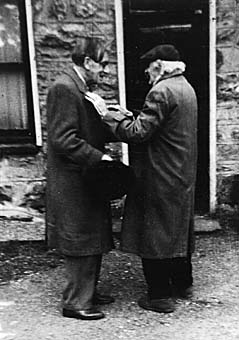Although he is English and not American, one cannot omit his name, for Louis Wilkinson was also a lecturer for some time in the United States. "The Archangel" as he was named by them has strong links with the Powys brothers whom he had known early and he had prestige in their eyes, because he was so strikingly different from them: a man of the world, seductive, and slightly demoniac, connaisseur of wine and women. He was a great friend of Llewelyn Powys, had a lot of admiration for Theodore Powys's work and a strong if sometimes difficult relationship with John Cowper Powys. He was one of the founders of the ULANY, with Arnold Shaw and Powys. He had known, among many well-known writers, Oscar Wilde, Aleister Crowley and Frank Harris. He lectured in the States at the same time as John Cowper and his name can be found among the members of the 'intelligentsia' of the Greenwich of the twenties. He met and married Frances Gregg in 1912, mostly through the agency of John Cowper, but they divorced in the early twenties. Wilkinson then married again three times. His last wife, Joan Lamburn, although much younger than Louis, died before him. Among his many books, he wrote several on the Powys which are generally well thought of: the best-known among those is probably Welsh Ambassadors (1936), which he wrote under the name of Louis Marlow. John Cowper, who wrote to him during all his life, valued his friendship, even though (or maybe because) he knew that Louis had ambivalent feelings toward him. His son, Oliver Wilkinson, described him thus: Wilkinson, Louis (1881-1966)
He had fought against evil conventions and laws. He was ruthless in some of his personal relationships, but ruthless, too, in fighting damnable prejudices... For long Louis was the black sheep of his family. His success as a lecturer, and then as a writer, finally reconciled him to them.
 |
|
Louis and John Cowper in front of 1, Waterloo Blaenau Ffestiniog |
Well you can guess from this disorganised sort of rambling folly and absurd gravity of pompous sentiment how I entertain the Archangel by my ups and downs.
I successfully conceal my departures from the path from his inquisitive eyes (and he is very inquisitive) he has a roving eye like a great red Magpie — or golden jackdaw — until I react and then the confessional spirit compels me to confess and the sly naughty dog chuckles like a great genial silly Punk. He says 'how seriously you assume the helm of state! how gravely, how absurdly gravely, you stand or fall — what does it matter?' Well, I find it hard to reply. I can only say that I have a sort of blind instinct in the matter which, comic though it may be, prevents me from regarding it as unimportant one way or another. (Letters to His Brother Llewelyn, 7 March 1908)
Much later, John Cowper will show his delight and affection in the portrait he draws of his old friend:And finally — if I may recapitulate (if that's the funny word), on top of Integrity & Sang Froid & sexual Rascality worthy of Scarron or Villon or even (though you may not yet have reached his three hundred and seventieth position) or even of the Ribald of Arezzo, for from out of Italy come all the origins of all the renaissances of civilizations — there enters with you, as Number 4, (infuriating to the enemies of Eros and of the Blessed Brothers of Priapus) a sort of Stately Old-fashioned almost Mid-Victorian (O! not vulgar "Edwardian" at all!) Dignity, & Diplomatic Urbanity, Suavity, Reserve & Ambassadorial Discretion such as some great Politician (I am not referring to Mr Gladstone) would display on his Augustan path... (Letters to Louis Wilkinson 1935-1956, January 6, 1949)
Whereas this is the — not very kind — portrayal of John Cowper given in Wilkinson's satirical book The Buffoon (1916), in which John Cowper is named "Jack Welsh", and Louis is "Edward":"Capital" Welsh hugged himself. "Nothing could please me better. What a situation! A master! You are indeed! You are a master! You understood me at once. I have an inordinate appetite for situations of any kind, humorous or melodramatic or sentimental. Oh, did Reggie tell you? We have just come from an elopement — an elopement!" Welsh gave the word a peculiarly succulent flavour; Edward was queerly reminded of 'canteloupe', so sweet and fruity was the intonation. "My brother Bertie. The bride's parents — dead against it. What could be more exciting? He and the girl — a frail exquisite creature, slender as a peeled willow wand, — they were married in Kensington, and then where do you think we all went? Where? Where? To a tavern by the river — at Wapping Old Stairs! Wapping Old Stairs! Think of it! Wapping Old Stairs!"
|
|